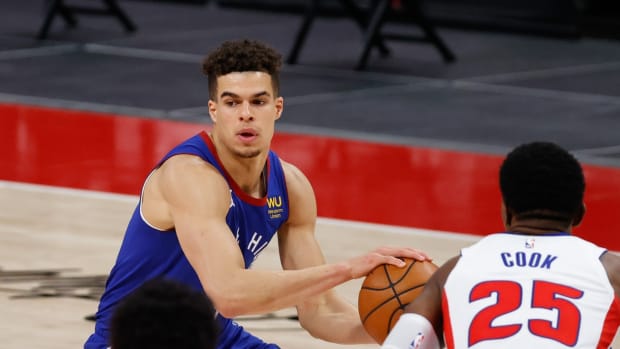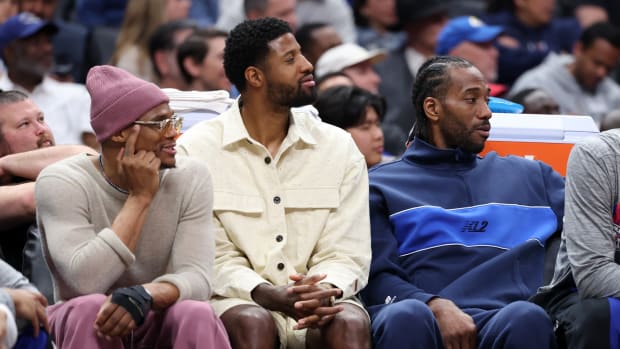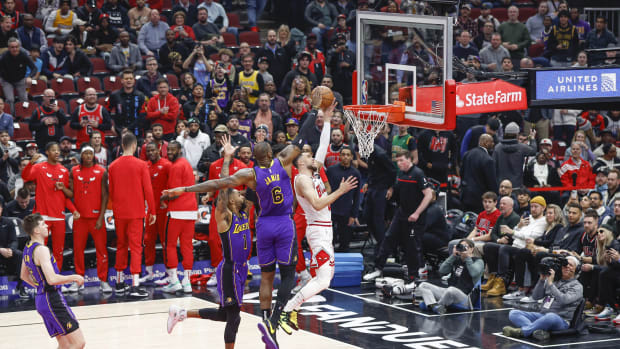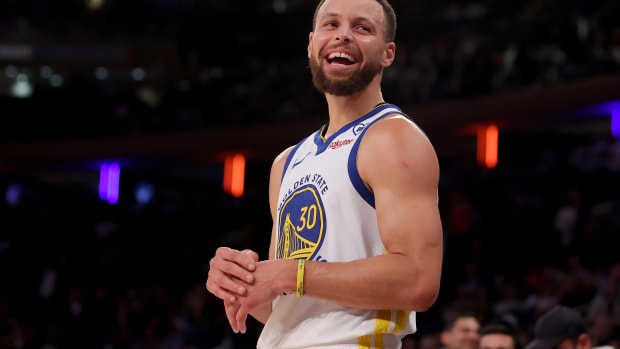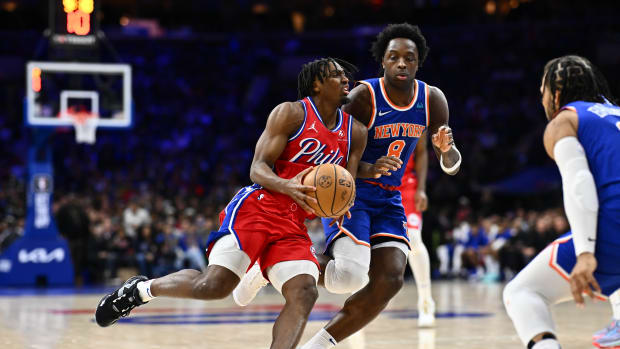Isaiah Austin daring to dream again after NBA hopes dashed
BOSTON -- Two hours before tip-off at TD Garden, Isaiah Austin slides into a crowded elevator. It’s opening night of the Celtics’ season, and amid chatter about their playoff chances, a man hauling video equipment turns to the 7-foot-1 Austin and asks the obvious question: “Are you playing basketball tonight?”
“No,” Austin says. “I’m long since retired.”
Away from Waco, Texas, Austin fields these kinds of questions often. He’ll pause and pose for a picture with anyone who asks, even if the seeker isn’t sure of Austin’s name. He’ll sign autographs. He’ll shake hands. He'll high-five strangers. But he seldom will offer a detailed answer. He prefers to keep moving forward.
The elevator doors open, and Austin shuffles out with his girlfriend, Baylor junior Erika Santos. He follows a woman from the Shamrock Foundation, the charity arm of the Celtics, through a tunnel toward a black curtain. Behind the curtain is the Celtics’ locker room, where his former high school teammate Marcus Smart awaits media interviews. Further beyond the locker room is the court, where his best friend from his Baylor teams, Nets forward Cory Jefferson, is shooting jumpers and testing his new knee tights. Smart and Jefferson are about to play their first NBA game.
Austin, 21, had dreamed of a night like this since he started playing 17 years ago. He’d picture himself in a darkened arena and listen as the announcer introduced him and the crowd came alive. But he is not here to play basketball tonight. In June, a week before the NBA draft, doctors discovered that Austin had Marfan syndrome, a genetic disorder that could kill him if he continued to play (see sidebar below). Instead, being here is the next step in answering a question that has both haunted him and healed him for the past four months:
After your dream dies, how do you find new life?
*****
The first time he heard the word Marfan was in May at the draft combine in Chicago, where he visited Dr. Robert Bonow for a routine checkup. Bonow noticed an abnormality in the EKG test and mentioned the potentially career-ending syndrome. The doctor ordered additional tests.
Austin told three people about Bonow's examination: Erika, Cory and his mother, Lisa Green. All of them said they’d pray for him, but none of them worried about the worst-case scenario. “God brought you too far to let you down at this point,” Lisa told him. That week, they were celebrating. Isaiah said two teams had told him that they’d select him in the first round if he were available. After he went public in January with the news that he had been blind in his right eye since high school, his draft stock had ranged from the lottery to the second round.
Unconcerned about his heart, Austin worked out privately for more than a dozen teams in May and June. He believed he was playing the best basketball of his life. He didn’t know yet that it would also be his last.
On June 20, Lisa was driving to her Kansas home from her job as senior vice president of Beauty Brands. Bonow called with the results of Isaiah’s blood work. “I knew in my heart that it wasn’t possible he wouldn’t be able to play,” she says. That made the doctor's revelation so stunning: Isaiah had Marfan syndrome. She kept her eyes fixed on the road even as her focus began to shift to all that Isaiah was about to lose.
At every stage of the sport, Isaiah had stood out. When he was 4, he played on a team of 5-year-olds and was the only one who could bring the ball up the court. Lisa and her husband, Ben Green, taught him to pass even though they knew that having him shoot was the team’s best chance to win. To them, those victories didn’t matter. They wanted Isaiah to grow up to be a good man. Being a good basketball player would be a bonus.
In 2005, when Isaiah was 11, Lisa sent him to a baseball camp. Unfamiliar with playing first base, Isaiah didn’t know that a pitcher could fake a pitch and try to catch a runner at first. He reacted to the throw a half-second late and the ball struck his right eye. His retina came loose, but doctors told his family not to worry. An expert in Marfan would have taken one look at Isaiah then – tall and lanky with long fingers and now an issue with his connective tissue – and diagnosed him. But no one he encountered saw the warning signs.
After five years in the Navy, Mitch Harris chases his big league dream
In 2008, in his final middle school basketball game, Isaiah dunked in layup line and landed to the sight of blood pouring from his right eye. He endured four surgeries that year, his vision improving briefly after every one only to regress again until he could no longer see. And each time, he’d be forced to remain on a massage table nearly 24 hours a day for weeks as he recovered (post-op patients must lay face down or risk undoing the surgical work). He had a mirror that allowed him to play video games with his brother, Noah. Ben helped him with his homework. His sister, Narah, visited him. His body weakened, but his bond with his family – whom Lisa calls the “starting five” – strengthened.
He made varsity as a freshman at Mansfield (Texas) High School before transferring to Grace Prep as a sophomore. That fall, a weary Isaiah declined to have a fifth surgery. He lost his vision in his right eye, and as a result, his depth perception. He had to relearn everything, from hitting a 15-foot jumper to pouring a glass of water. But Ben and Lisa didn’t allow him to use his eye as an excuse, nor did his high school coach Ray Forsett. And they watched as a kid with one eye became one of the top five recruits in the country.
Austin chose to stay close to home at Baylor, where he averaged 13 points as a freshman after learning over the summer how to shoot from scratch again because collegiate backboards were clear. As a sophomore last season, Austin battled back from a torn labrum in his right shoulder to help lead the Bears to the Sweet 16.
By the time Lisa arrived home that Friday night in June, she was bawling. Ben instantly knew what had happened. “Pack up,” he said. “We’re driving to Texas tonight.” (Ben and Lisa had moved to Kansas when Isaiah was a freshman at Baylor.) With Ben behind the wheel for the eight-hour drive, Lisa began making phone calls – to Isaiah’s agent, Dwon Clifton, to ESPN’s Holly Rowe, who had profiled Isaiah in January. Noah, who was in the back seat with Narah, cried himself to sleep. In the silence between phone calls and sobs, the family wondered why. Years of battling blindness wasn’t enough? A year and a half of sitting in the stands at Baylor and biting their tongues as they listened to adults jeer Isaiah for mistakes wasn’t enough either? How could God have allowed this to happen?
At 4 a.m., they arrived at the home of a friend named Evelyn. Ben and Lisa slept for two hours before rising again. At the end of the day, they’d deliver the news to Isaiah.
*****
What is Marfan syndrome? |
Marfan is a genetic disorder that affects the body's connective tissue. What does that mean? Connective tissue is found throughout your body, so Marfan can affect people in a variety of ways – most commonly in the heart, blood vessels, bones, joints and eyes. |
The news traveled to Isaiah's support system through phone calls and text messages; it reached them in gyms and parking lots, on highways and in living rooms. It brought them to tears and to computers. What was Marfan syndrome? And how could it possibly cost Isaiah an opportunity to play in the NBA?
Ray Forsett was in the parking lot outside of Prime Prep Academy of Dallas (where he became coach after Isaiah left for college) on the night of June 20 when Isaiah’s agent called. Ray heard the diagnosis and then nothing else. He dropped his phone onto the gravel and sat silently in the front seat of his car. When he collected his phone again, he called Lisa, who asked him to take care of Isaiah the next day so that friends and family could gather before Isaiah learned of his diagnosis. Ray called Isaiah and acted casual, telling him to be ready early for workouts on Saturday.
Ray picked up Isaiah on Saturday morning and took him to the house of NBA guard Mo Williams, a family friend, in Dallas. Isaiah worked out and then took a break in the afternoon to play video games. Ray slipped away for a few moments to call Lisa. Through tears, he told her that he couldn’t take it anymore. “I felt like I was setting him up to get shot,” Ray recalls. Lisa told him to stay strong and to bring him to Evelyn’s house. It was time. On the drive to Grand Prairie, Ray remembers hearing only sad songs on the radio, like Boyz II Men’s End of the Road. When they arrived, cars were lining Evelyn's driveway and the street.
“What’s happening?” Isaiah asked.
“Just go inside,” Ray told him.
Isaiah walked in the front door, past the stairs on the left and the dining room on the right, and turned into the living room. He saw his mother standing, tears in her eyes. He knew. “No, this can’t be happening,” he said. He slid down the wall. After a minute or two of strained silence, he got up and went to the bathroom across the hall. He didn’t want to cry or say anything he’d regret in front of Noah, now 15, and Narah, 11. They looked up to him.
Ten minutes later, he emerged from the bathroom with dry eyes. He met Erika on the steps. She put her arm in his and her head on his shoulders. The group assembled around them in the entryway to the house. Ray's father, Bishop Forsett, who used to give the pep talks before games at Grace Prep, began to pray. And then he started singing Kirk Franklin’s More Than I Can Bear. On the CD, the track begins with weeping. It ends with exultation.
I've gone through the fire
And I've been through the flood
I've been broken into pieces
Seen lightnin' flashin' from above
But through it all I remember
That He loves me
And He cares
And He'll never put more on me
Than I can bear
“It was like a funeral,” Bishop says. “There was a death that night. So you might as well drag all the dead stuff out and allow room for the life to come back in.”
Over the next 12 hours, this is how life came back in: First, Baylor coach Scott Drew took a whistle out of his pocket and presented it to Isaiah. Of course Isaiah could have his scholarship back, and he would be welcome as a graduate assistant. Second, Isaiah and Cory went for a walk around the neighborhood and parked themselves at a bench by a lake. As they stared at the water, Cory came to a decision. It wasn’t supposed to happen this way, he knew, but he would be damned if a rookie from Baylor wasn’t wearing Isaiah's No. 21 in the NBA next season. So he told Isaiah that he would switch from 34 to 21.
The moment that affected Isaiah most didn’t come until the next morning. When he returned home, he went upstairs to his room with Erika. It was after 1 a.m. and he had to be up in six hours to share the news with ESPN’s Rowe and the world. Erika fell asleep in his arms, but Isaiah lay awake. He watched the light come into his room again and heard his mom knock to tell him it was time to go.
Isaiah wore black and answered questions slowly. Lisa couldn’t watch. She went over to Bishop and his wife, Abby, and told them she had to leave. “As painful as it is,” Bishop told her, “you have to stand for all the mothers who will one day need to sit in your seat.” And then the words that would change everything came to him. He shared them with Lisa first, and she felt the hairs rise on her arm. “You have to go tell Isaiah,” she said.
They all walked over to him. “The Lord says that dreams don’t come from the individual – dreams come from me,” Bishop told Isaiah. “When dreams get to the point where they seem to be at an end, God is telling you something: Never fail to dream again.
“Dream again, Isaiah.”
******
“Before we continue tonight,” NBA commissioner Adam Silver said, “I want to take a moment to recognize Baylor center Isaiah Austin.”
Isaiah rose from his table. On Monday morning, three days before the draft, he wasn’t even sure if he’d still be invited. Only moments earlier had he been informed about what was about to happen.
“You may have heard about Isaiah,” Silver continued. “He was one of the nation’s best collegiate players and was expected to be picked tonight before the discovery just a few days ago that he had a genetic disorder called Marfan syndrome and is no longer able to play competitive basketball. Like the other men here tonight, Isaiah committed himself through endless hard work and dedication to a potential career as a professional basketball player, and we wanted to make sure he fulfilled at least this part of his dream. So it gives me great pleasure to say that with the next pick in the 2014 NBA draft, the NBA selects Isaiah Austin from Baylor University.”
Isaiah dropped his head and covered his face with his hands. He walked on the stage and hugged the commissioner. He wouldn’t be able to play basketball, but if he completed his degree, the NBA had a job waiting for him. It was the most memorable moment of the draft – the moment, Isaiah would say later, when he stopped sulking.
But as the calendar turned to August, the darkness hovered again. He had to find an apartment in Waco, so he called his best friend, Elliot Dickrell, who also worked with the basketball team. He picked his classes and bought his books. Classes began on Aug. 25, and he would keep a strict schedule: Wake up at 7 a.m. and resist the urge – the habit – of going straight to the gym. Go to class from 8 a.m. to 2 p.m. and then head to the gym, where he’d work out with players or rebound for them. Then he’d have dinner around 7 and go to tutoring for a couple of hours.
Before August, he’d see Erika at least once a day when they were in the same town, and they’d talk while they were apart. Now he’d return only one text message in 10, and he’d see her maybe once a week. Elliot would come by but discover Isaiah's door locked and walk away. His parents were 630 miles away. Ray and Bishop would call, but he’d keep all his conversations short. Again, he was thinking of them: He didn’t want to bring down everyone. But through his grief, he learned what he’d gained. Because of Marfan syndrome, at any time when a coach had him run suicide sprints – and the players sometimes did for an hour straight at Baylor – or when he stayed in the gym to hoist 500 shots by himself, he could have collapsed from overexertion. Isaiah was thankful to be alive.
So alone in his room, he’d turn again to what his mother had told him when he lost vision in his eye: “You can make it your excuse or your story.” He’d look to his left arm and see the words from Corinthians facing him, “For we walk by faith and not by sight,” and discover a new meaning that wasn’t about blindness. He’d begin to dream again and to put the same dedication that brought him to the brink of the NBA into those dreams. He became a spokesman for the Marfan Foundation. He began to write a book. He started the Isaiah Austin Foundation to promote Marfan awareness. He distributed thousands of bracelets at Baylor with the words “Dream Again.” And he discovered a different side of basketball as a graduate assistant, mopping sweat off the floor, handing out water bottles and breaking down film with his players.
“I never played basketball just so I could make it to the NBA,” Austin says. “I wanted that, of course, but I just loved the game. And now I’ve discovered so much more that I love.”
*****
When Isaiah Austin lost his ability to play basketball, what did the world gain?
The Marfan Foundation's website, which attracted only 50,000 hits a month, skyrocketed to 500,000 after Austin’s diagnosis. Most people with Marfan are self-diagnosed, so those visiting the site are potentially saving their own lives. In Texas, a 15-year-old named Owen was diagnosed with Marfan two weeks after Austin. Owen told his father that he wanted to attend “An Evening with Isaiah,” Austin’s first gala for his foundation. Owen’s father thought they’d be able to raise enough money to buy a seat at the table. By the end of the week, though, they had raised $7,500, enough to buy the entire table, so they invited other kids with Marfan to join them.
Back in Boston for the beginning of the NBA season, Austin sees Owen on the court before the game and runs over to give him a high-five. There are a dozen boys and girls with Marfan there, many of whom had never met another kid like them before this trip. The Celtics have partnered with the Marfan Foundation this season, and tonight they're honoring Austin with their "Heroes Among Us" award.
At a break in the second quarter, Austin walks onto the court. He hears the sweet sound of his name and a more thunderous roar than when Rajon Rondo was introduced in the starting lineup. A crowd of 18,000 is on its feet.
This is the funeral for Isaiah’s old dream. The NBA season has opened without him. By halftime, he’ll be responding to emails from his academic adviser about an English paper that’s due the next day. By next week, he’ll be Baylor’s homecoming king. By next year, he might be a best-selling author. One dream is dead, but so much more is beginning.


































